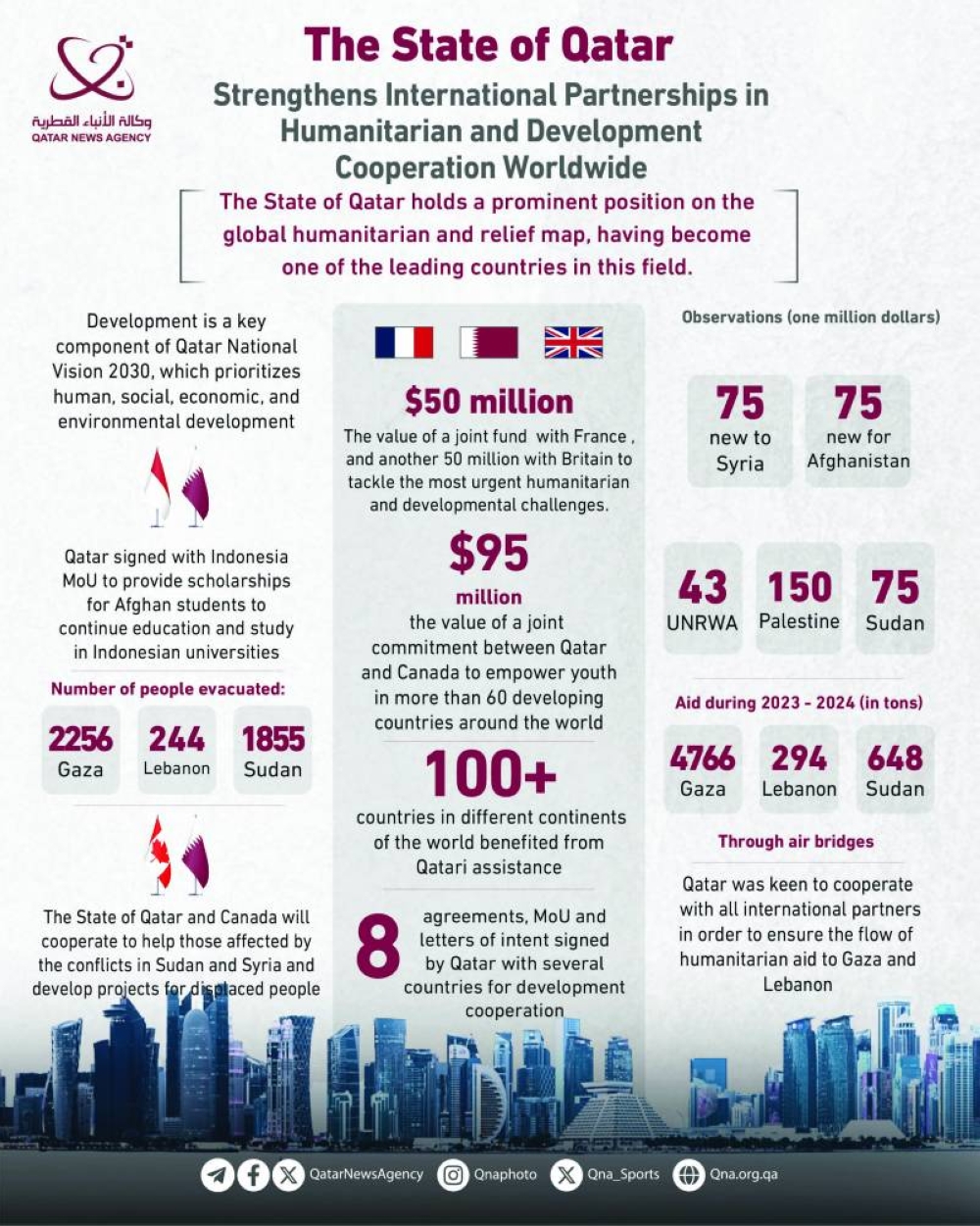Qatar holds a prominent position on the global humanitarian and relief map, having become one of the leading countries in this field. Its institutions are at the forefront of initiatives in regions affected by conflict, disasters, and crises across the globe.
To ensure the effectiveness of these efforts, Qatar has doubled its efforts and strengthened strategic partnerships with many countries. The country has launched more initiatives aimed at helping communities that are most vulnerable to risks, disasters, and poverty worldwide.
Development is a key component of Qatar National Vision 2030, which prioritises human, social, economic, and environmental development. Qatar has taken multiple approaches to enhance its international partnerships in this field, benefiting humanity through relief projects and improving the lives of millions across the world.
In this context, Qatar, along with the United Kingdom and France, launched an initiative for international development co-operation and humanitarian response, allocating $50mn through a joint fund to tackle the most urgent humanitarian and developmental challenges, reflecting a shared responsibility to respond to global crises.
Qatar has signed several agreements, memorandums of understanding, and letters of intent, including an MoU with Canada to enhance development co-operation. This partnership focuses on strengthening joint foreign aid policies, empowering youth, promoting women’s economic and social roles, and reducing poverty to achieve sustainable development goals.
Under this memorandum, both countries will collaborate on activities in shared sectors, with a focus on education and aligning views on issues discussed at multilateral forums and events.
Qatar, through Education Above All Foundation, and Canada, through the Global Affairs Canada, have committed a joint $95mn to empower youth in over 60 developing countries.
Qatar and Canada will also collaborate on assisting conflict-affected populations in Sudan and Syria through humanitarian aid and joint projects for displaced people.
Both countries have affirmed their commitment to providing humanitarian assistance to Gaza in close collaboration with Jordan, as well as supporting Gaza residents evacuated to Qatar for medical treatment, particularly focusing on psychological and mental health support in partnership with the Qatar Red Crescent Society.
During the visit of His Highness the Amir Sheikh Tamim bin Hamad al-Thani to Sweden, several memorandums of understanding were signed to enhance co-operation between the two countries. These include memorandums of understanding on peace and reconciliation, humanitarian and development co-operation, and social development and family support.
Qatar and France also signed several agreements related to humanitarian and development co-operation, including an MoU on facilitating co-operation between the Qatar Fund for Development (QFFD) and the French Development Agency (AFD), as well as declarations of intent concerning development and humanitarian aid and emergency response.
Moreover, Qatar and Indonesia signed a memorandum of understanding (MoU) to provide scholarships for Afghan students to continue their education at Indonesian universities.
Qatar has been keen to co-operate with all international partners to ensure the continuous flow of humanitarian aid to Gaza and Lebanon, consistently emphasising the need for sustainable delivery of assistance.
In the context of growing international partnerships, Qatar’s relations with France and the United Kingdom have yielded fruitful collaboration in providing humanitarian aid, particularly to Gaza and Lebanon.
Furthermore, Qatar’s close co-operation with Turkiye has resulted in sending a ship loaded with more than 1,900 tonnes of humanitarian aid to the besieged Palestinian brothers in Gaza, which reflects a shared vision regarding the unprecedented humanitarian crisis in the region and the need for regional and international efforts to address it by all means.
In terms of humanitarian collaboration between Qatar and Italy, a joint effort to alleviate the suffering of Palestinian civilians in Gaza saw the arrival of the Italian ship “Vulcano” at the port of La Spezia, Italy, carrying a number of wounded individuals from Gaza for treatment in Italian hospitals.
The ship had sailed from the port of Al Arish in Egypt, carrying 60 Palestinians, including 18 children wounded in the ongoing war in Gaza and 42 family members. The ship’s medical team included six members of the Qatari armed forces. The ship had docked at the Egyptian port of Al Arish for nearly two months, functioning as a field hospital to provide medical services to injured Palestinians coming from Gaza.
The humanitarian medical co-operation between Qatar and France also stands as a leading example of humanitarian work and healthcare relief, as French Navy aircraft transported 124 injured individuals from Gaza, with 54 of them later transferred to Qatar for treatment.
Additionally, both countries co-operated in a joint operation to deliver ambulances, tents, and humanitarian supplies to Gaza, agreeing on the urgent need to increase the delivery and flow of humanitarian aid throughout Gaza and to continue their joint efforts in providing emergency assistance.
Qatar’s international co-operation strategy supports the goal of advancing economic and social development in low-income countries, in line with the global objectives of the 2030 Sustainable Development Agenda. This strategy supports the global partnership for development to eliminate poverty, reduce inequalities, and promote economic development and environmental sustainability. Many countries across all continents have benefited from Qatar’s aid, which has reached more than 100 nations worldwide.

